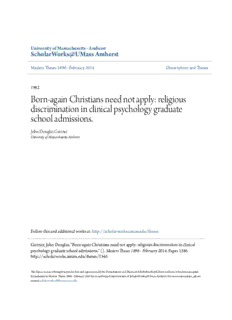Table Of ContentUUnniivveerrssiittyy ooff MMaassssaacchhuusseettttss AAmmhheerrsstt
SScchhoollaarrWWoorrkkss@@UUMMaassss AAmmhheerrsstt
Masters Theses 1911 - February 2014
1982
BBoorrnn--aaggaaiinn CChhrriissttiiaannss nneeeedd nnoott aappppllyy:: rreelliiggiioouuss ddiissccrriimmiinnaattiioonn iinn
cclliinniiccaall ppssyycchhoollooggyy ggrraadduuaattee sscchhooooll aaddmmiissssiioonnss..
John Douglas Gartner
University of Massachusetts Amherst
Follow this and additional works at: https://scholarworks.umass.edu/theses
Gartner, John Douglas, "Born-again Christians need not apply: religious discrimination in clinical
psychology graduate school admissions." (1982). Masters Theses 1911 - February 2014. 1546.
https://doi.org/10.7275/q1k8-7052
This thesis is brought to you for free and open access by ScholarWorks@UMass Amherst. It has been accepted for
inclusion in Masters Theses 1911 - February 2014 by an authorized administrator of ScholarWorks@UMass
Amherst. For more information, please contact [email protected].
BORN-AGAIN CHRISTIANS NEED NOT APPLY: RELIGIOUS DISCRIMINATION
IN CLINICAL PSYCHOLOGY GRADUATE SCHOOL ADMISSIONS
A Thesis Presented
by
JOHN DOUGLAS GARTNER
Submitted to the Graduate School of the
University of Massachusetts in partial fulfillment
of the requirements for the degree of
MASTER OF SCIENCE
September 1982
Department of Psychology
-AGAIN CHRISTIANS NEED NOT APPLY: RELIGIOUS DISCRIMINATION
IN CLINICAL PSYCHOLOGY GRADUATE SCHOOL ADMISSIONS
A Thesis Presented
by
JOHN DOUGLAS GARTNER
Approved as to style and content by:
ravid Todd Ph rperson of Committee
leek Ajzen Ph.D., Member
Bonnie R. Strickland, Department Head
Department of Psychology
ACKNOWLEDGEMENTS
I would like to thank my committee—leek Ajzen, Stanley Moss,
my Chairperson, David Todd and former Chairperson Castellano Turner,
for their interest in and support of my work. I would also like
to thank my wife, Alison Gartner, for her valuable discussion,
editorial assistance and general support and patience. I am also
grateful to Trina Hosmer and the consulting staff of the University
Computer Center for their assistance in the statistical analysis
of this data. Finally, a group of individuals who have participated
in my spiritual, intellectual and personal development deserve to
be acknowledged: my parents, Harry and Damaris (to be) Segal,
Hugh and Naomi Miller, Ken and Louise Jasko, Ronald Comer, Steven
Mattis, Richard Kovner, Paul Vitz, Jaqueline Wallace, and most of
all the Lord Himself.
iii
DEDICATION
To Alison, whose effervescence
love and wisdom brighten ray life
and
to all future Christians
who seek to enter the
field of psychology.
iv
TABLE OF CONTENTS
ACKNOWLEDGEMENT
INTRODUCTION
Chapter
I. LITERATURE REVIEW
3
Psychoanalysis
5
Freud
5
Psychoanalysis after Freud
11
Humanistic Psychology
20
The Validity of the Charges.
. 28
Chapter
II. THE STUDY
35
General Purpose and Hypothesis
35
Experimental Hypotheses.
. . . 38
Chapter
III. METHOD
40
Overview
40
Subjects
41
Materials
42
Procedure
46
Chapter
IV. RESULTS
Response Rate
47
Comparability of Groups 47
....
Group Diffferences on the Dependent Variables 48
Intercorrelation of the Dependent Variables 56
Relationship Between the Demographic and
Dependent Variables
59
Effect Size 62
Chapter
V. DISCUSSION 68
Empirical Support for the Experimental Hypotheses. 68
. .
Summary and Conclusions 77
REFERENCES 80
APPENDIX 85
v
LIST OF ILLUSTRATIONS
L. Subjects' good feelings about the applicant's potential to
make a good clinical psychologist as a function of
rou
8 P
50
2. Subjects' doubts about the applicant's potential to make a
good clinical psychologist as a function of group ....
52
3. Subjects' need to interview the applicant as a function
of group
Y 54
4. Subjects' likelihood of admitting the applicant as function
of group
57
5. Subjects' need to interview the applicant as a function
of group and religion
63
6. Subjects' likelihood of admitting the applicant as a
function of group and religion
65
vi
"
INTRODUCTION
Like about 1,000 other people, Sandra was disappointed on
April 1st to find a rejection slip in her mail from a Northeastern
graduate program in clinical psychology, which we will call Dudley
University. It was a bit of a blow, since both her interviewers
had been visibly impressed with her "perfect record," and she had
expressed a strong interest in Dudley. What was more painful,
however, was the reason for her rejection, told to a friend of hers
by a professor on the admissions committee: "We felt that someone
of her religious orientation would not feel comfortable in the
program.
Sandra was a born-again Christian, but her psychological orien-
tation was psychoanalytic, as was Dudley's. She was not interested
in integrating her faith with her practice of clinical psychology,
nor were her research interests anything but secular. In fact,
her research fit quite well into that of several faculty members.
In short, there was at least no visible way in which it could be
said that her faith would interfere with her functioning like any
other student. It seems that membership in this particular reli-
gious group was in itself sufficient grounds for rejection.
Sandra got into another school she actually liked better and
thus dropped her plans for a possible lawsuit. That happy ending
is only partially comforting, however, for her case raises a dis-
turbing question. Was this an isolated incident, or is such reli-
gious discrimination a systematic and widespread practice in
clinical psychology admissions? The purpose of this study will
b,
to answer that question.
Description:in my spiritual, intellectual and personal development deserve to . would not be surprised to discover that this problem may be per- vasive. becoming God himself beside the Father, and in truth in . They sawno need to search for .. Rollo May views "dependency" on God as a regression to an.

